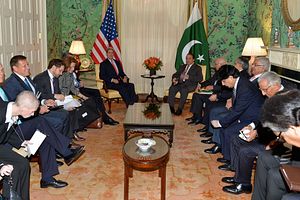With murmurs of a potential U.S.-Pakistan nuclear deal and Pakistani Prime Minister Nawaz Sharif’s visit to the United States, there has been a lot of good writing on U.S.-Pakistan relations and Pakistani foreign and security policy recently. Looking ahead to the weekend, here are some of the articles you should be reading on U.S.-Pakistan relations.
A civil nuclear agreement? Much has been made of the prospect of the United States offering Pakistan a civil nuclear agreement like the one concluded with India in 2005. The story first came out courtesy of the Washington Post and the New York Times. In The Diplomat, there have been multiple pieces exploring the logic of such a deal (see here, here, and here). Elsewhere, in Foreign Policy, Dhruva Jaishankar writes on why U.S. policymakers simply don’t learn how to handle Pakistan over time. In Dawn, Pakistani columnist Cyril Almeida outlines the “working transaction” underlying U.S.-Pakistan relations. Also, in case you missed it, ahead of Sharif’s visit, Pakistan’s foreign secretary confirmed the conditions under which Pakistan would use its low-yield, short-range nuclear weapons against India.
Sharif in Washington. First, Rohan Joshi breaks down the Obama-Sharif joint statement here at The Diplomat. In the Wall Street Journal, Sadanand Dhume outlines the United States’ complicity in undermining Pakistan’s fragile democracy. In the National Interest, Arif Rafiq points to how Washington should leverage positive trends in Pakistani politics. Rafiq’s conclusion is ultimately optimistic: “While Pakistan has suffered immensely in the past decade from terrorism, misgovernance and poor economic growth, it may end up being an oasis of calm in an increasingly unstable part of the world. But as Pakistan shelters itself from the storm of hitting the Middle East and South Asia today, a tighter embrace between Islamabad and Washington becomes even more necessary.” The full joint statement is available on the White House’s website here.
The other Sharif. Nawaz Sharif may be the prime minister, but the real power rests where it usually does in Pakistan: with the chief of army staff, General Raheel Sharif (no relation to the prime minister). Michael Kugelman describes the burgeoning cult of personality in Pakistan around Sharif (even packs of men’s underwear bear his face). In a similar vein, the Wall Street Journal‘s Saeed Shah and Adam Entous describe Sharif’s enduring and growing appeal in Pakistani politics. One quote is particularly striking from Muhammad Atiq Mir, the chairman of the All Karachi Tajir Ittehad: “There is God in the sky, and here on the ground there is Raheel Sharif.”

































